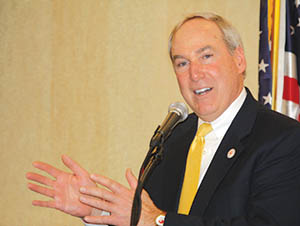
Phil Korson was having a problem filling the program for the annual Cherry Marketing Institute luncheon—because he was part of the program, a secret part he didn’t know about. He was the gap in the program.
The Cherry Marketing Institute is 25 years old this year, and Korson has been president from day one. Members of its board and other cherry growers organized a tribute to Korson during the meeting in Traverse City, Michigan, in January.
They credited Korson with hammering out a disciplined, profitable industry from the raw material of growers and processors who, until he came on board, acted like rivals and competitors.
Korson had graduated from Michigan State University, where, among other things, he was a champion bull rider on the rodeo team. Veteran growers Don Gregory and Glenn Lacross said it took someone like that to tame the cherry industry. “He got thrown a thousand times and kept getting back on,” retired grower Bob Underwood added.
The institute was formed in 1988—just two years after tart cherry growers had voted out the federal marketing order they’d had (and argued and complained about) since 1972. After experiencing prices as low as a nickel a pound, they came back together in 1996 to vote in another order to control tart cherry supply.
Korson gets a lot of credit for making that happen.
“Phil is really good at helping people reach consensus,” said Jim Nugent, a former extension educator and now a tart cherry grower. His ability to organize the industry kept the U.S. Environmental Protection Agency from delisting azinphos-methyl (Guthion) for about eight years while it sought alternative insecticides.
“We were last to lose it because we had the data,” Nugent said. Korson collected it from growers’ spray records.
He was the spark plug behind a program that each year brings EPA personnel to Michigan to see how growers actually do things, and how they use pesticides.
In Michigan, a special university funding mechanism was put in place in 1998, called Project GREEEN. “The concept came from Phil Korson,” Nugent said. “He took the idea for a plant industry initiative to Fred Poston [dean of the College of Agriculture at Michigan State University], and they sold it to the legislature.”
Because of his people skills and his likable personality, leaders of other commodities in Michigan look to Korson for help, said grower Jeff Send. “He knows the people—all of them,” he said.
“Yes, Phil always smiles,” said Julie Gordon, CMI’s only other full-time employee, there 13 years. “When I came here, we were counting coupons for retail market promotions. Now we hire a world-renowned ad agency.” She cited his can-do attitude, his drive and passion, adding, “He’s extremely organized—for a man.”
Korson gets credit for leading growers to back a promotion program positioning tart cherries as a health food, a super-fruit even, and hiring the advertising agency Weber-Shandwick to carry it out. The chief goal of CMI is to expand sales and use of tart cherries.

Leave A Comment